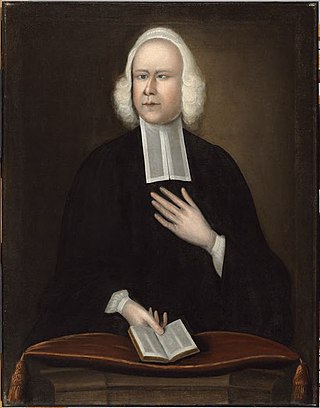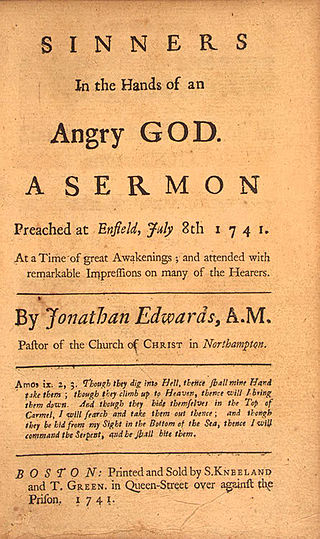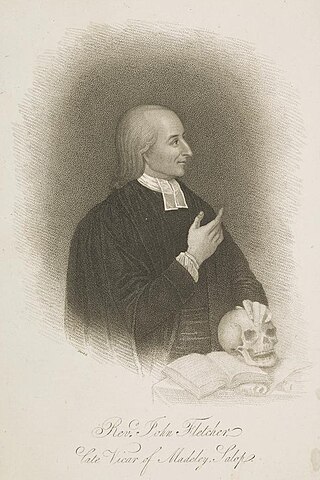Methodism, also called the Methodist movement, is a Protestant Christian tradition whose origins, doctrine and practice derive from the life and teachings of John Wesley. George Whitefield and John's brother Charles Wesley were also significant early leaders in the movement. They were named Methodists for "the methodical way in which they carried out their Christian faith". Methodism originated as a revival movement within Anglicanism with roots in the Church of England in the 18th century and became a separate denomination after Wesley's death. The movement spread throughout the British Empire, the United States and beyond because of vigorous missionary work, and today has about 80 million adherents worldwide.

George Whitefield, also known as George Whitfield, was an English Anglican minister and preacher who was one of the founders of Methodism and the evangelical movement. Born in Gloucester, he matriculated at Pembroke College, Oxford in 1732. There, he joined the "Holy Club" and was introduced to John and Charles Wesley, with whom he would work closely in his later ministry. Unlike the Wesleys, he embraced Calvinism.

John Wesley was an English cleric, theologian, and evangelist who was a principal leader of a revival movement within the Church of England known as Methodism. The societies he founded became the dominant form of the independent Methodist movement that continues to this day.

Francis Asbury was a British-American Methodist minister who became one of the first two bishops of the Methodist Episcopal Church in the United States. During his 45 years in the colonies and the newly independent United States, he devoted his life to ministry, traveling on horseback and by carriage thousands of miles to those living on the frontier.

Charles Wesley was an English Anglican cleric and a principal leader of the Methodist movement. Wesley was a prolific hymnwriter who wrote over 6,500 hymns during his lifetime. His works include "And Can It Be", "O for a Thousand Tongues to Sing", "Christ the Lord Is Risen Today", "Love Divine, All Loves Excelling", the carol "Hark! The Herald Angels Sing", and "Lo! He Comes With Clouds Descending".
The Holiness movement is a Christian movement that emerged chiefly within 19th-century Methodism, and to a lesser extent influenced other traditions such as Quakerism, Anabaptism, and Restorationism. Churches aligned with the holiness movement teach that the life of a born again Christian should be free of sin. The movement is historically distinguished by its emphasis on the doctrine of a second work of grace, which is called entire sanctification or Christian perfection. The word Holiness refers specifically to this belief in entire sanctification as an instantaneous, definite second work of grace, in which original sin is cleansed, the heart is made perfect in love, and the believer is empowered to serve God. For the Holiness movement, "the term 'perfection' signifies completeness of Christian character; its freedom from all sin, and possession of all the graces of the Spirit, complete in kind." A number of Christian denominations, parachurch organizations, and movements emphasize those Holiness beliefs as central doctrine.

The First Great Awakening, sometimes Great Awakening or the Evangelical Revival, was a series of Christian revivals that swept Britain and its thirteen North American colonies in the 1730s and 1740s. The revival movement permanently affected Protestantism as adherents strove to renew individual piety and religious devotion. The Great Awakening marked the emergence of Anglo-American evangelicalism as a trans-denominational movement within the Protestant churches. In the United States, the term Great Awakening is most often used, while in the United Kingdom, the movement is referred to as the Evangelical Revival.
The Primitive Methodist Church is a Methodist Christian denomination within the holiness movement. It began in England in the early 19th century, with the influence of American evangelist Lorenzo Dow (1777–1834).
The Presbyterian Church of Wales, also known as the Calvinistic Methodist Church, is a denomination of Protestant Christianity based in Wales.
The Methodist Church of Great Britain is a Protestant Christian denomination in Britain, and the mother church to Methodists worldwide. It participates in the World Methodist Council, and the World Council of Churches among other ecumenical associations.

The conservative holiness movement is a loosely defined group of theologically conservative Christian denominations with the majority being Methodists whose teachings are rooted in the theology of John Wesley, and a minority being Quakers (Friends) that emphasize the doctrine of George Fox, as well as River Brethren who emerged out of the Radical Pietist revival, and Holiness Restorationists in the tradition of Daniel Sidney Warner. Schisms began to occur in the 19th century and this movement became distinct from parent Holiness bodies in the mid-20th century amid disagreements over modesty in dress, entertainment, and other "old holiness standards". Aligned denominations share a belief in Christian perfection, though they differ on various doctrines, such as the celebration of the sacraments and observance of ordinances, which is related to the denominational tradition of the specific conservative holiness body—Methodist, Quaker, Anabaptist or Restorationist. Many denominations identifying with the conservative holiness movement, though not all, are represented in the Interchurch Holiness Convention; while some denominations have full communion with one another, other bodies choose to be isolationist.

The cell group is a form of church organization that is used in many Christian churches. Cell groups are generally intended to teach the Bible and personalize Christian fellowship. They are always used in cell churches, but also occur in parachurch organizations and other interdenominational settings, where they are usually referred to as Bible study groups. In Methodism, they are known as class meetings and are a means of grace; in Catholicism, they are known as basic ecclesial communities.

John William Fletcher was a Swiss-born English divine and Methodist leader. Of French Huguenot stock, he was born in Nyon in Vaud, Switzerland. Fletcher emigrated to England in 1750 and there he became an Anglican vicar. He began to work with John Wesley, becoming a key interpreter of Wesleyan theology in the 18th century and one of Methodism's first great theologians. Fletcher was renowned in Britain for his piety and generosity; when asked if he had any needs, he responded, "...I want nothing but more grace."

Wesleyan theology, otherwise known as Wesleyan–Arminian theology, or Methodist theology, is a theological tradition in Protestant Christianity based upon the ministry of the 18th-century evangelical reformer brothers John Wesley and Charles Wesley. More broadly it refers to the theological system inferred from the various sermons, theological treatises, letters, journals, diaries, hymns, and other spiritual writings of the Wesleys and their contemporary coadjutors such as John William Fletcher, Methodism's systematic theologian.
The Wesleyan Methodist Church was the majority Methodist movement in England following its split from the Church of England after the death of John Wesley and the appearance of parallel Methodist movements.
Christian revivalism is increased spiritual interest or renewal in the life of a Christian church, congregation or society with a local, national or global effect. This should be distinguished from the use of the term "revival" to refer to an evangelistic meeting or series of meetings. Proponents view revivals as the restoration of the church to a vital and fervent relationship with God after a period of moral decline.

The history of Methodism in the United States dates back to the mid-18th century with the ministries of early Methodist preachers such as Laurence Coughlan and Robert Strawbridge. Following the American Revolution most of the Anglican clergy who had been in America came back to England. John Wesley, the founder of Methodism, sent Thomas Coke to America where he and Francis Asbury founded the Methodist Episcopal Church, which was to later establish itself as the largest denomination in America during the 19th century.

Sarah Wesley, née Gwynne, also known as Sally Wesley was the wife of itinerant Methodist Charles Wesley, brother of John Wesley, the main founder of Methodism. The daughter of a wealthy family, Wesley once performed musically for George III and passed this talent onto two of her sons, both of whom were musical prodigies.

The Bible Methodist Connection of Churches is a Methodist denomination within the conservative holiness movement. The connection is divided into four regional conferences: the Southern Conference, led by Rev. John Parker; the Southwest Conference, led by Rev. G. Clair Sams; the Heartland Conference, led by Rev. Chris Cravens; and the Great Lakes Conference, led by Rev. David Ward.












